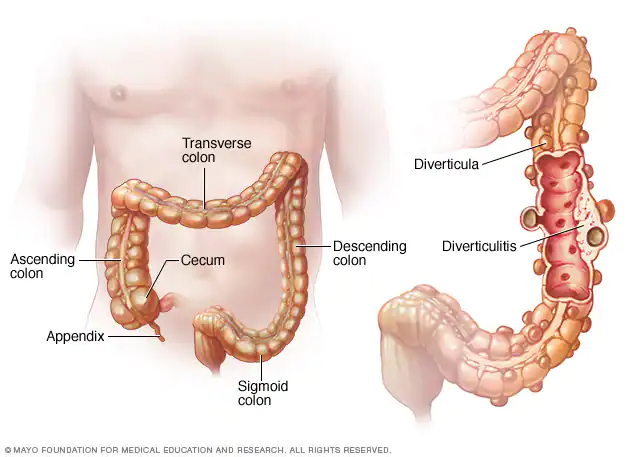What Is Diverticulitis?
Diverticulitis is associated with the formation of diverticula, which are pouch-shaped formations that occur along your digestive tract. Diverticula most often occur in the colon, i.e., the large intestine.
These pouches are a result of weak spots in the intestinal walls that tend to blow outward. The pouches (diverticula) can become inflamed or infected by bacteria, thus causing diverticulitis.
Diverticulitis Vs. Diverticulosis
Diverticulitis
- It is associated with the formation of pouches called diverticula that become inflamed or infected.
- There is a chance of recurrence.
- Diverticulitis can also turn chronic in some people.
- The risk of developing diverticulitis increases with age.
Diverticulosis
- Diverticulosis is associated with the formation of pouches called diverticula that are not infected or inflamed.
- It usually doesn’t exhibit any symptoms, and if the condition actually does cause symptoms, it is referred to as symptomatic uncomplicated diverticular disease (SUDD).
- In rare cases, diverticulosis can result in the development of diverticulitis.
- As in the cases of diverticulitis, the risk of developing diverticulosis increases with age.
Unlike diverticulosis, diverticulitis can cause mild to severe symptoms that can occur all of a sudden or gradually over a few days.
Signs And Symptoms
The common signs and symptoms associated with diverticulitis are:
- Abdominal pain that typically occurs in the lower left side
- Nausea
- Vomiting
- Fever
- Increased urinary frequency
- Diarrhea
- Constipation
- Blood in the stool
Diverticulitis is caused by a combination of factors that are discussed below.
Causes And Risk Factors
The root cause of diverticulitis is the blockage of the opening diverticula. This blockage is usually triggered by the accumulation of fecal matter that leads to inflammation and subsequent infections.
Other factors associated with an increased risk of diverticulitis are:
- A diet low in fiber
- Heredity: A family history of the condition
- A sedentary lifestyle
- Obesity
- Smoking
- Regular use of certain nonsteroidal anti-inflammatory medications like aspirin
- A deficiency in vitamin D
- Sex: In those aged 50 or younger, diverticulitis is more common in men, whereas, in those aged above 50, it is more common in women.
- Advancing age
Since the symptoms of diverticulitis are similar to those of many other health conditions, your doctor may need to carry out one or more of the following tests to diagnose your condition.
How Is Diverticulitis Diagnosed?
You may be asked about your symptoms, medical history, and the medications you are on. Other diagnostic tests may include:
- A physical exam to check the abdomen for tenderness
- A digital rectal exam to look for symptoms of pain, bleeding, masses, or other problems
Other diagnostic tests that may need to be carried out include:
- Blood tests to look for inflammation, anemia , or other medical conditions like kidney or liver problems
- Imaging tests like an abdominal ultrasound or CT scan
- Urine test to look for different types of infections
- Stool test to check GI infections
- Pelvic examination to rule out gynecological problems
- Women may have to take a pregnancy test to rule out pregnancy
Once your condition is diagnosed, your doctor may prescribe treatments depending on the severity of the symptoms.
Treatments For Diverticulitis
The treatment options for diverticulitis may include:
- A clear liquid diet
- A low-fiber diet
- Medications for diverticulitis include antibiotics like Metronidazole, Ciprofloxacin, or Amoxicillin
- Follow-up medical appointment to check if your symptoms have improved
- Surgery for severe cases of diverticulitis
The symptoms of diverticulitis can usually be managed right at home in the initial stages. However, in rare cases, it can lead to complications, and those suffering from acute cases may need to be admitted to a hospital for treatment.
The home remedies that can help in managing the symptoms of diverticulitis are listed below.
How To Manage The Symptoms Of Diverticulitis Naturally
- Slippery Elm
- Aloe Vera Juice
- Vitamin D
- Licorice Root
- Grapefruit Seed Extract
- Ginger
- Garlic
- Turmeric
- Apple Cider Vinegar

